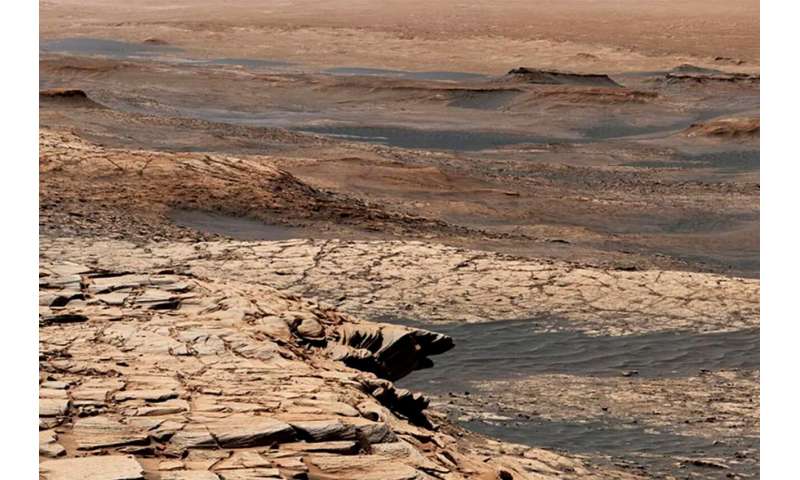Scientists have found proof of an ancient Martian ocean, and it could mean we're closer to finding life on Mars

Mars is known for its crimson, frozen terrain, but a recent discovery from a team of researchers provides new evidence that there was once an ancient ocean on the now-harsh Martian terrain.
The discovery is evidence that Mars was, at one point in its history, quite different–a warm, wet planet. Evidence of a 3.5 billion-year-old, 900-meter thick shoreline in the northern hemisphere of Mars also hints at the possibility that life developed on the planet, which could be a boon for those hoping to find proof of extraterrestrial life.
"This is one of the great scientific questions of humanity," says Gregory Fiete, professor of physics at Northeastern. "It's a question of the present because we don't know yet if there is life elsewhere off of Earth."
"We know that on Earth life originated very early in the ocean, so this same time period, it could have originated on Mars if Mars had an ocean. Whatever time it was that the water was there, it's probably long enough by the Earth clock to have life originate there."
In the scientific community, there has been an ongoing debate about whether Mars' lower elevation northern hemisphere could be the site of an ancient ocean. Using tools developed by the United States Geological Survey and map data from NASA and the Mars Orbiter Laser Altimeter, the team set about mapping the planet's northern area. What they discovered was more than 6,500 kilometers of ridges, which they grouped into 20 systems.
By looking at sedimentary accumulation, the direction of erosion and other stratigraphic evidence, researchers were able to determine that these ridges were likely eroded river deltas, or the remains of an ancient Martian shoreline.
"Sediments from that basin flow in, fill it slowly over time, liquid water accumulates, and this is pretty conclusive proof that this basin was filled slowly over time and was an ocean of liquid water," says Jaqueline McCleary, assistant professor of physics at Northeastern.
At the same time, this provides fairly convincing evidence of a warm and wet period in Mars' history. The slow, steady filling of this northern basin could not have happened if conditions on Mars were like they are now.
"It means that the atmosphere was much thicker, so it would have trapped heat from the sun, so that it was at a temperature where there could be liquid water," Fiete says.
Given how current science points to life having evolved in the oceans on Earth, Fiete says that the presence of an ocean during a warm, wet period for Mars is promising evidence that some form of life could have also developed on Mars around the same time.
"Earth also had an ocean in its very early history, and I think one of the things that is most intriguing about this discovery is that we know on Earth that life appeared very shortly, on geological time scales, after Earth's creation," Fiete says. "Maybe a few hundred million years or so after these oceans existed on Earth, which was a very short time after Earth itself existed, we see the first signs of life on Earth. This is a time period that coincides with this ocean on Mars that was discovered."
Taken one step further: If life was able to develop on Mars and Earth from a common set of conditions, it stands to reason that there is life elsewhere in the cosmos.
"It increases the probability dramatically that life will be elsewhere in the universe because two places with similar conditions both got life," Fiete says. "It means the origin of life is not some freak event."
McCleary says one of the most exciting ramifications of this discovery is that the stratigraphic methods used by these researchers could help scientists uncover physical proof of Martian life in the future.
"Because on Earth where we see sedimentary layers we also see a fossil record, one could also theoretically drill down into the Martian surface and examine the geological levels and look for a fossil record," McCleary says.
The technology to dig 900 meters into Mars doesn't currently exist, but Fiete says there are also quantum technologies that could be used to find evidence of Martian life. Radiocarbon dating uses the decay of radioactive isotopes of carbon to date objects made out of carbon. Fiete says something similar could be used on Mars to identify the location of imbalanced numbers of isotopes, which, although not fossils, is also proof that life was once present.
"It's kind of like a ghost of life," Fiete says. "We don't find something as concrete as a fossil, but you find physical signatures that life was there because there's some abnormal concentrations of certain isotopes and elements."
Methodologically, McCleary says this study is further proof that interdisciplinary "cross-pollination" can help spark innovation and discovery. These researchers used an established technique in a new context and discovered something that could potentially change how we think about our place in the universe.
"You've got the Search for Extraterrestrial Intelligence searching for this intelligent life, sending out probes, and all along there's been ancient life the next planet over, which is evocative and exciting for a species that's continually looking to understand itself and also look for things like itself elsewhere in the universe," McCleary says.
Provided by Northeastern University